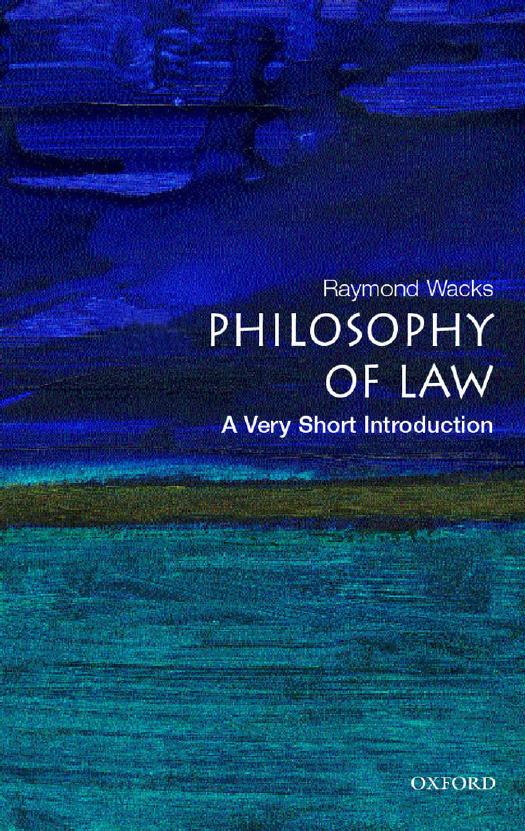Philosophy of Law: A Very Short Introduction by Raymond Wacks

Author:Raymond Wacks
Language: eng
Format: epub, pdf
Publisher: OUP Oxford
Published: 2014-07-14T16:00:00+00:00
7. Nelson Mandela with the author soon after the former South African presidentâs release from 27 years of imprisonment. A trained lawyer, Mandelaâs dedication to the overthrow of apartheid made him an international symbol of the struggle against injustice, and a champion of the establishment of liberty and equality under law
Constitutional change has been wrought through the strength of legal and moral argument based on the relatively uncomplicated concept of human equality.
The concept of human rights has acquired a prominent place in contemporary political and legal debate today. Turn on the news or read a newspaper: issues of human rights are ubiquitous. Though the concept (in the form of ânatural rightsâ see Chapter 1) first emerges in the Middle Ages, the recognition in the 17th and 18th centuries of the secular notion of human rights was a significant intellectual moment in history. The idea rests on the claim that each of us as a human being, regardless of our race, religion, gender, or age, is entitled to certain fundamental and inalienable rightsâmerely by virtue of our belonging to the human race. Whether or not such rights are legally recognized is irrelevant, as is the fact that they may or may not emanate from a âhigherâ natural law (see Chapter 1).
The acceptance by the United Nations, in the aftermath of the Holocaust, of the Universal Declaration of Human Rights in 1948, and the International Covenants on Civil and Political Rights, and Economic, Social and Cultural Rights in 1976, reveals a dedication by the community of nations to the universal conception and protection of human rights (see Figure 8).
Human rights have passed through three generations. The first generation were mostly the negative civil and political rights as developed in the 17th and 18th centuries by English political philosophers like Hobbes, Locke, and Mill (see Chapter 1). They are negative in the sense that they generally prohibit interference with the right-holderâs freedom. A good example is the First Amendment to the American Constitution, which makes it unlawful for the legislature to restrict a personâs freedom of speech.
The second generation consists in the essentially positive economic, social, and cultural rights, such as the right to education, food, or medical care. The third generation of human rights is primarily collective rights which are foreshadowed in Article 28 of the Universal Declaration. This declares that âeveryone is entitled to a social and international order in which the rights set forth in this Declaration can be fully realizedâ. These âsolidarityâ rights include the right to social and economic development and to participate in and benefit from the resources of the earth and space, scientific and technical information (which are especially important to the Third World), the right to a healthy environment, peace, and humanitarian disaster relief.
Download
Philosophy of Law: A Very Short Introduction by Raymond Wacks.pdf
This site does not store any files on its server. We only index and link to content provided by other sites. Please contact the content providers to delete copyright contents if any and email us, we'll remove relevant links or contents immediately.
| Anthropology | Archaeology |
| Philosophy | Politics & Government |
| Social Sciences | Sociology |
| Women's Studies |
The remains of the day by Kazuo Ishiguro(7551)
Tools of Titans by Timothy Ferriss(6950)
The Black Swan by Nassim Nicholas Taleb(6192)
Inner Engineering: A Yogi's Guide to Joy by Sadhguru(5897)
Giovanni's Room by James Baldwin(5879)
The Way of Zen by Alan W. Watts(5800)
The Six Wives Of Henry VIII (WOMEN IN HISTORY) by Fraser Antonia(4791)
The Power of Now: A Guide to Spiritual Enlightenment by Eckhart Tolle(4756)
Astrophysics for People in a Hurry by Neil DeGrasse Tyson(4620)
Asking the Right Questions: A Guide to Critical Thinking by M. Neil Browne & Stuart M. Keeley(4576)
12 Rules for Life by Jordan B. Peterson(3734)
The Ethical Slut by Janet W. Hardy(3504)
Skin in the Game by Nassim Nicholas Taleb(3462)
Housekeeping by Marilynne Robinson(3402)
The Art of Happiness by The Dalai Lama(3385)
Double Down (Diary of a Wimpy Kid Book 11) by Jeff Kinney(3274)
Skin in the Game: Hidden Asymmetries in Daily Life by Nassim Nicholas Taleb(3264)
Walking by Henry David Thoreau(3234)
12 Rules for Life: An Antidote to Chaos by Jordan B. Peterson(3204)
